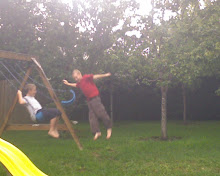Now that I’m finished with my last church calling, which was to be the Primary President of the ward, I realize I learned a lot in that position, and as a counselor to the same organization. I am indeed a changed, and improved person.
The first thing I endured was the president telling me, as a new counselor, how to dress. Other leaders I talked to about this said that the President had the final word on most matters, it’s her organization. Changing my dress was hard on me, but I allowed it and voluntarily followed the charge because I had a feeling that my manner of Sunday dress could use some improvement, so I took the opportunity of that pressure to force myself to improve in that area. Next, I employed organization. I compiled all the information we had to work with, and copied it all in triplicate, so that each member of the presidency would have their own copy. I learned that not everyone keeps paper records of things, and furthermore that if I did not provide them with their own copies of how-to sheets, that they would not ask for them. In doing this, I also learned that specialization can and should occur in presidencies. We each had things we were over, and in charge of. For example, even though I was the 2nd counselor, lowest in rank, I was clearly the one out of the three of us who would be keeping the written records and producing the lists of what needed to be done.
I learned that meetings have a leader. The leader leads the meeting, and reserves the right to tell how it is at that meeting, but that the leader does not always know what is going on in every department of the organization. Nor does she need to. That’s why there are three of you. I learned that a three-legged stool really is a good representation of a three-person church presidency. That there are many cases, and it can easily and repeatedly happen where one person eases off and doesn’t pull the workload of the other two. Also, that when that happens, there is really nothing the other two can do about it. Motivational speeches are lost in this case, they annoy the person, and don’t change the fact that they are free to choose when and how much they will serve.
One large overall lesson I learned, as the various presidencies I participated in served, taught, and met, was that every one does things their own way. This is rather obvious, I would imagine. But I hadn’t envisioned all the results of this truth. We each had to teach lessons, but each lesson was different, and that was okay, we were all following the general instructions in our own way. It turned out that there was a lot of leeway allowed for while still maintaining the proper execution of our duties.
After a year or so in these callings, I finally realized how to apply this knowledge to my benefit. Not only could I allow those I work with to do things in their own way, but I applied it to myself and began allowing myself to run meetings, teach lessons, and organize activities my way as well, when those things were mine to decide.
I learned a lot about how the organization of the church works. I know that while callings are, indeed, entirely inspired and come from revelation from God, that the human being offered the calling has many options. When I was young, I thought when you were offered a calling, the possible answers were yes or no. Then, I was taught that the only answer is yes. But, after having been involved in the calling of probably 30 or more people, I see that there are many possibilities. Mostly, I’ve seen that it is, in fact, appropriate to tell your priesthood leaders when you are having troubles in your life that make it hard for you to do your calling. Not to complain all the time, but that there are times when they need that information, and it’s easier for them to get it from you then for them to have to pray about every member in the ward, just in case! They can then take that information to the Lord and learn what to do about it. But there’s nothing wrong with them knowing what’s best for you. Other possibilities in calling serving allow for illnesses, vacations, and school and work time conflicts. All of these things may be discussed with a priesthood leader when accepting, serving in, or at the end of a calling in the ward. Also, there are times when it might even be appropriate, if and when motivated by the Spirit of the Lord, to request more or less work. Sometimes it matters that you do certain work, but sometimes it just matters that you do any work. I’m sure it changes back and forth throughout a person’s life.
The best allowance, and probably the most common thing that happens, is that a person, can, in times of family crisis, have a period of lower duties while still retaining the current calling. This appears to be the best way to work things out, when possible, instead of suffering for long periods of time needlessly or asking to get released from service and the blessings thereof. I didn’t know this before, and as we had family struggles during times of heavy callings, we suffered, so then I felt very trapped by callings. Now I know that one lesson in having callings that can be learned is that each person needs to find the balance between standing up for your self and serving. Serving is wonderful, whereas serving blindly is very much not something Brian and I recommend.
I’ve witnessed how the Spirit of the Lord can somehow make it possible for a person to go from just knowing 80 children, to knowing them personally, caring for them as an individual, and loving them, probably with the love of Christ. There’s just no other means by which a person can suddenly love that many kids, but I did. I knew each of them very well, and would’ve stretched myself, and did sometimes, if I knew it could help them. This alone was quite a great evidence to me of the divinity of callings in the church.
I also learned many great administrative things. I learned how to be President, meaning what the difference is between President and Counselors. The difference, which took me over a year to learn, is this: counselors counsel, they give advice, they carry out assigned duties; presidents also offer suggestions to the group, and they also carry out duties (though usually self-assigned), but when it comes down to it, the president makes the final decision. Often, this final step may not be required, there may be a consensus without it. However, a counselor should never do something that the president disagrees with. To my regret, I did not learn in time how to execute that lesson.
Presidents, in fact, probably should and usually do a lot more officiating, instructing, and decision making than I actually did, since I don’t do these things naturally. My deficiencies in that area caused me many problems, with 2 of my 5 eventual counselors over the whole time in my presidency effectively defecting – no longer working under me as if I were President. I have many faults, and telling others what to do is surely high on the list of things I don’t do well. I’m just grateful that some time will pass now before I am placed in a position like that again. Hopefully I can grow, and develop those skills more.
I am not at all a person who likes to lead large groups. Small groups and unofficially, maybe, but nothing grand. Agreeing with everyone else that I was the leader of an organization with 80 children and about 30 adults in it was definitely something I would not naturally do. I did it to serve God, as a favor to him. Not once did I ever try to deceive myself into believing that I was worthy of such a role or that I could pull off such duties without help from the Lord and his caring angels.
This brings my summary to a close. There are of course, many tiny, subtle, things I learned, but I probably couldn’t pull those specifics out of my head very well. Suffice it to say that it was a huge job, with huge lessons learned. Brian and I have decided that callings are an opportunity to be stretched, then relaxed, like a rubber band. Growing more malleable, more flexible, and more able with each pull. In the end, the benefits of the work done in each calling is our own, for we can use our new skills for our benefit for the rest of our lives.
Alaska to California: The last chapter
6 years ago




No comments:
Post a Comment